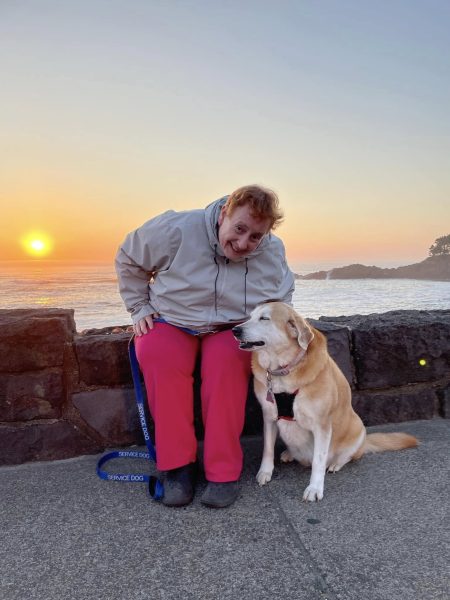
It is bedtime and Dolly is ready for her bedtime story. She finds the book she wants and brings it to her mom. Dolly curls up on her bed with a contented smile on her face. It’s bedtime after a long day filled with many adventures.
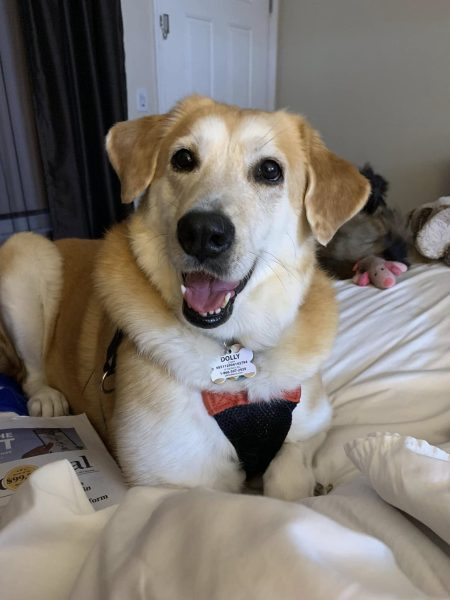
Mom is Debby Barnard and Dolly was her 14 year old service dog who passed away in October of this year. Their bond was special as Dolly was more than just a companion. She also worked as a service dog for Barnard. Dolly helped Barnard through some of the most difficult times of her life. She suffered PTSD related to her abusive first marriage, nervous breakdowns and the death of her second husband, Dick. Dolly was trained to take care of Barnard whenever she had an anxiety attack in public. She could also alert her about her blood sugar changes.
Life-long Love of Dogs
Barnard has had a life-long love of dogs. She got her first dog at six years old. Princess was a Coonhound that wouldn’t hunt racoons. Her grandfather gave the beagle puppy to her. She loved caring for dogs that were not the most desirable for one reason or another. She learned early in life that her love of dogs would bring her a lifetime of joy.
Barnard began with service dogs in 2012. Her first one was Kaylee, a small Tibetan spaniel.

Kaylee was bred to be a show dog, but she had bad teeth and her then owner couldn’t show her. Barnard took in Kaylee and worked with a professional trainer to see what services the puppy might be able to provide. Kaylee learned to recognize dementia episodes when Barnard’s husband was diagnosed with dementia. She would alert Barnard of each episode.
Dolly Arrives
As her needs changed over time, Barnard found that she had need for a bigger dog. Late in 2014 she met Dolly, an eclectic mix or Golden retriever, Labrador and Sheba Inu with very distinctive and desirable markings. Barnard rescued her from a puppy mill in San Antonio after she had had countless litters. She was only 30 pounds and in poor health. Dolly spent the first two months with Barnard getting healthy and experiencing new things. For instance, she walked on grass for the first time. After cautiously stepping on it, she loved it and began to race around.
She also loved running on the beach but did not like the water.

Dolly was a smart dog. She loved to work. This is one reason her breed makes such good service dogs. Also, they build tight bonds with their handlers.
Dolly Learns Quickly
Dolly’s training went so well she learned in 10 months what typically takes 2-3 years to master; she was even able to help train other puppies. Barnard could show her a task a couple of times and she could do it.
Known for her very calm and patient demeanor, Dolly was attacked three times by a variety of dogs but she wouldn’t fight back. She just waited for Debby to pull the dogs off her. Dolly loved to just lay and watch the world and chase bees. She loved going on adventures and walking with Barnard. Everything became an adventure – even the simplest errands.
In early 2020, Kaylee had to be put to sleep. Barnard also had a cat named Blinky, who had to be put down around same time. Dolly struggled as she lost her two animal friends so abruptly.
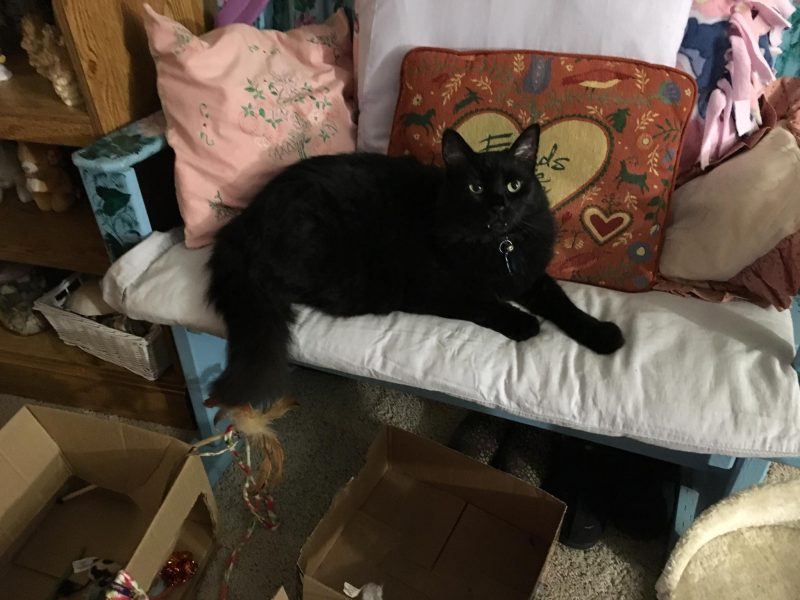
Next, Barnard fostered a German Shepard, Mika, in order to train her and possibly keep her, but she wasn’t a very ‘smart’ dog and didn’t learn the training. Worse, she pulled Debby over four separate times. So, Barnard took her to a farm with other dogs where she could run free.
Welcome Levi
Dolly was diagnosed with cancer – a small tumor on her side nine months ago. By this time, Barnard had adopted another puppy, Levi, a three year old Tibetan spaniel dog.

He has only been in training for 10 months. Psychiatric handicaps seem to be his specialty. Dolly helped Barnard train Levi to assist with her anxiety, panic attacks, PTSD, nightmares and hyperventilation. By slowing his own breathing it helped Barnard regulate her breathing. As a bonus, Barnard found out Levi can alert her of an oncoming asthma attack.
Life has been so much freer and enjoyable for Barnard with a service dog. She used to have to plan each day and each errand to avoid anxiety-inducing situations, but with Dolly, and now Levi, she can just get in her car and go on adventures. Barnard enjoys photographing their many adventures.
Dolly Goes to School
Barnard and Dolly taught classes about service dogs in various venues, including First Responder departments, schools, and businesses. Dolly was the only dog Barnard had who learned to use a canine phone in emergency responder situations – a button connected to 911. She also learned how to be comfortable around various emergency vehicles.
According to Barnard, “In schools, service dogs like Dolly can be so versatile. They can assist with autism, epilepsy and other seizures.” Barnard taught the children how to treat service dogs differently from other dogs, such as asking the owner before petting the dog.
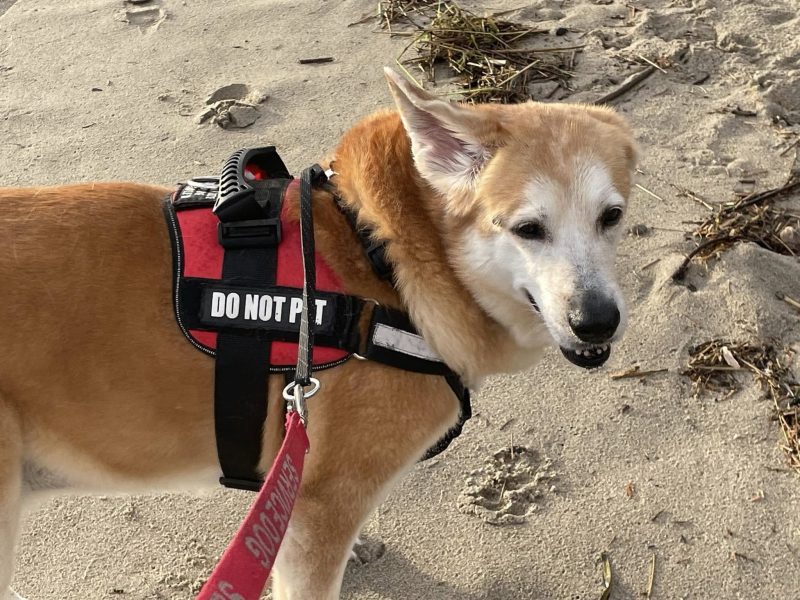
Types of Helper Dogs
Barnard says it is important to distinguish among the three major types of helper dogs: Emotional Support Dogs (ESDs), Therapy Dogs, and Service Dogs.
ESDs are prescribed by a mental health professional to provide companionship and emotional support to individuals with mental or emotional disabilities such as anxiety, depression or PTSD. Because they are prescribed they require no certification. They are used to make their handler feel better and therefore require no specific training.
Therapy Dogs are usually used to provide comfort and affection for people in various settings such as hospitals, nursing facilities, schools and court rooms. When children read to dogs in school, those are Therapy Dogs.
Service Dogs Are Special
Service dogs perform tasks that make their handler’s life easier. For mental health issues, dogs must learn to attach to their handlers in order to learn their needs.
Seizure dogs are a type of Service dog that know to lead their handler to a quiet place, lay them down, and rest their own head under their handler’s head to keep it from hitting the floor during the seizure. Barnard notes, “If you see a dog by itself in a public place, you might want to follow it because it may be leading you to a person in need.”
Service dogs normally return to a training facility if their services are no longer necessary for the original handler unlike Police and Military dogs, who typically remain with their trainers after they are retired.
Interestingly, the Americans With Disabilities Act (ADA) manual doesn’t consider service dogs as dogs. They are considered instruments such as a wheel chair and must be allowed into businesses and other areas where a therapy animal may not be allowed.
According to Barnard it is very important that businesses and people learn what makes service dog unique from other dogs. The dogs do not need certification or registration. Businesses can ask certain questions, such as “What tasks will it perform?” But they can’t ask what specific disability the dog helps with. Businesses can also ask if the dog is well-behaved. If the dog misbehaves, business owners can ask to have the dog wait outside or in their vehicle.
Barnard’s Journey to Find Her Community
Barnard would love to teach service dog classes here on the coast if there ever is enough interest. Because of her experiences with Dolly, Barnard has a passion to help destigmatize mental health issues and use pets to help people handle their mental disabilities.
Dolly was able to get Debby through the worst times of her life. She considered suicide. She even had a plan and gave God 30 days to show her hope. A job opened up in Coos Bay, far from her family, but she says it was the blessing she needed because it gave her a purpose. Later, she moved here to Depoe Bay. She found a church family at the Lincoln City Church of Christ that loved her and her dogs.
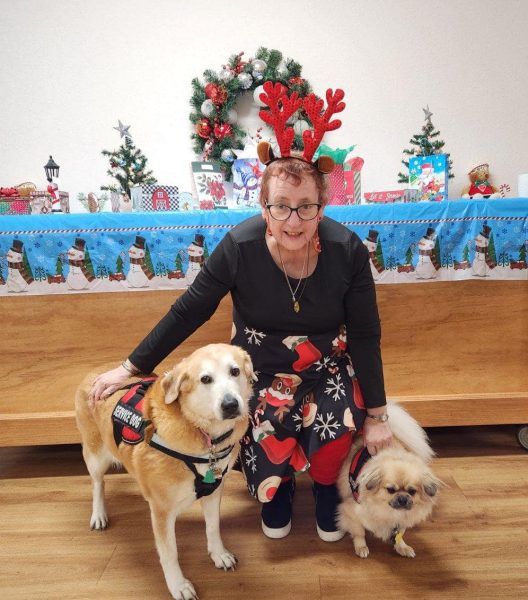
“This church is the first one I have been with that practices true, unconditional love. we have felt loved and cared for.”
Dolly was a compassionate dog and would sit with others having a bad day, “Which,” according to Barnard, “is an unusual characteristic for a service dog – usually they are loyal only to handler.”
In October of this year, Barnard knew that Dolly’s tumor had grown and the dog’s quality of life was quickly deteriorating. “It was time to let her go,” she said. “Losing Dolly has been difficult – for me and the entire church family.”
Barnard has documented the many adventures with Dolly in photos. If they were put into a book, Dolly would probably pull that book from the shelf for Barnard to read to her as she fell asleep with a smile on her face. We should all be so fortunate to have a companion like Dolly. The dog may be gone but her spirit lives on in all the people’s lives she touched.
Asked to sum up Dolly’s life, Barnard thought for a long moment about her life with Dolly and all the adventures they had together before she simply said, “She was amazing.”







It was a wonderful article honoring Dolly but all service dogs. Loved it.